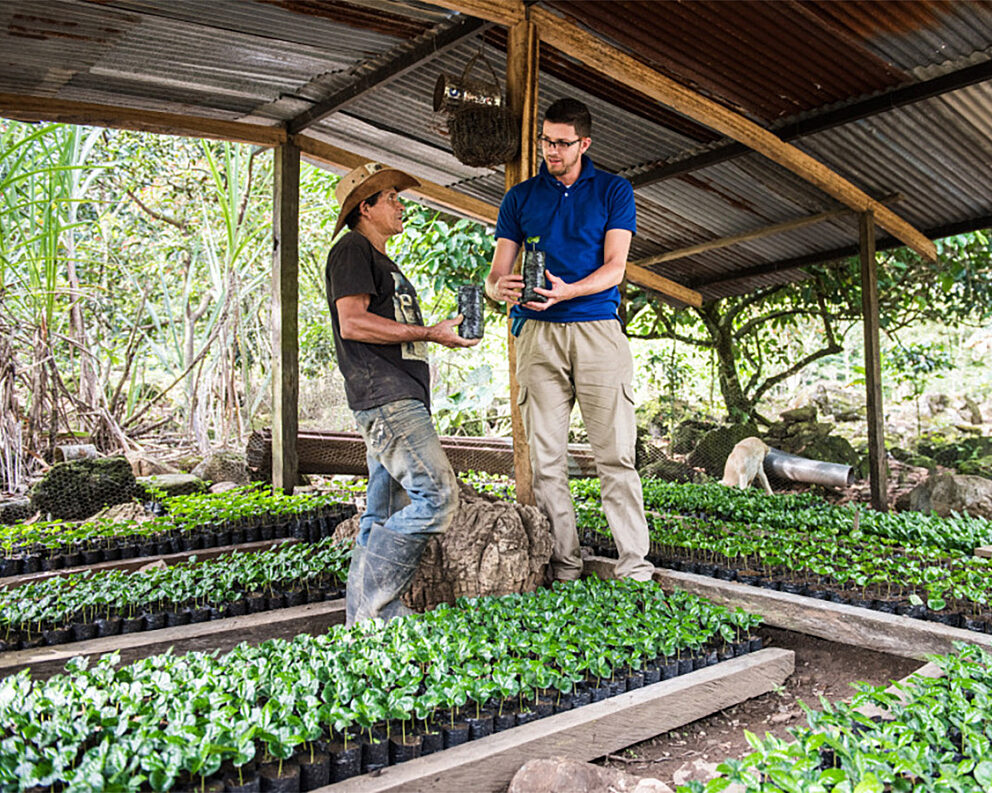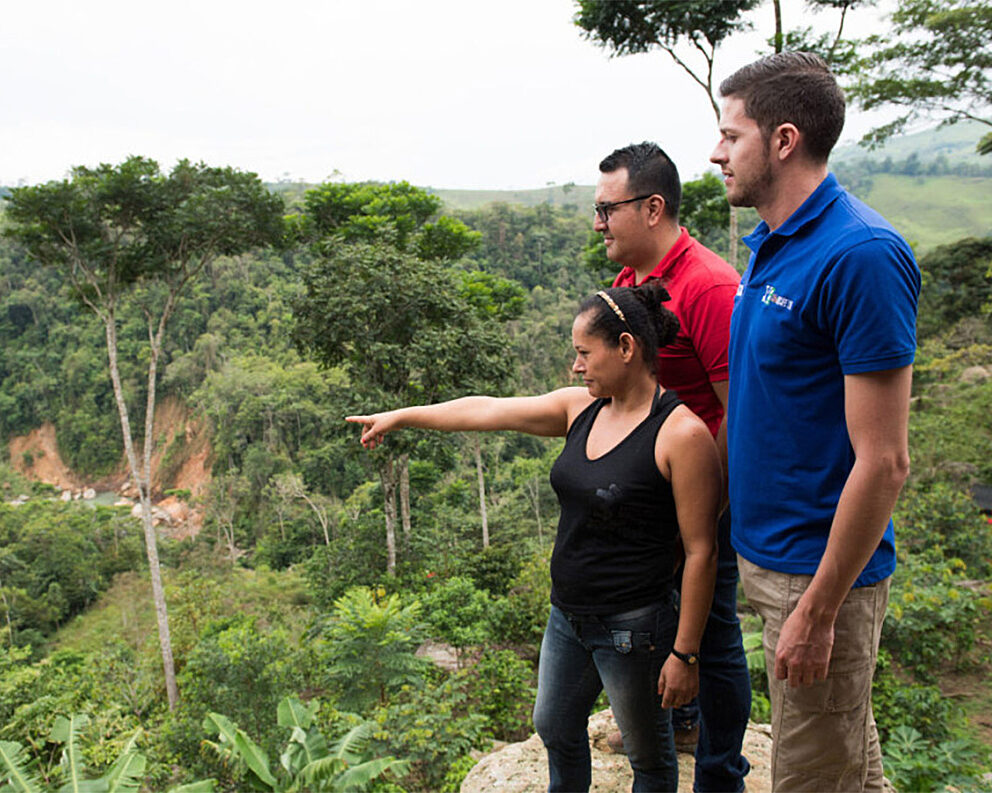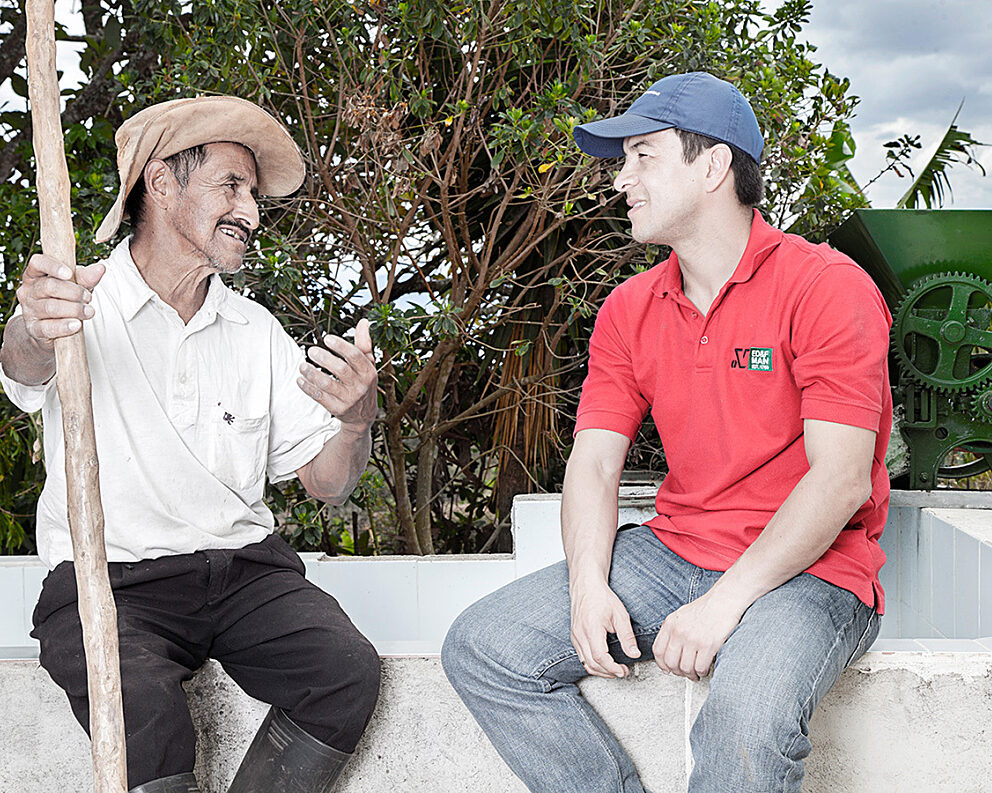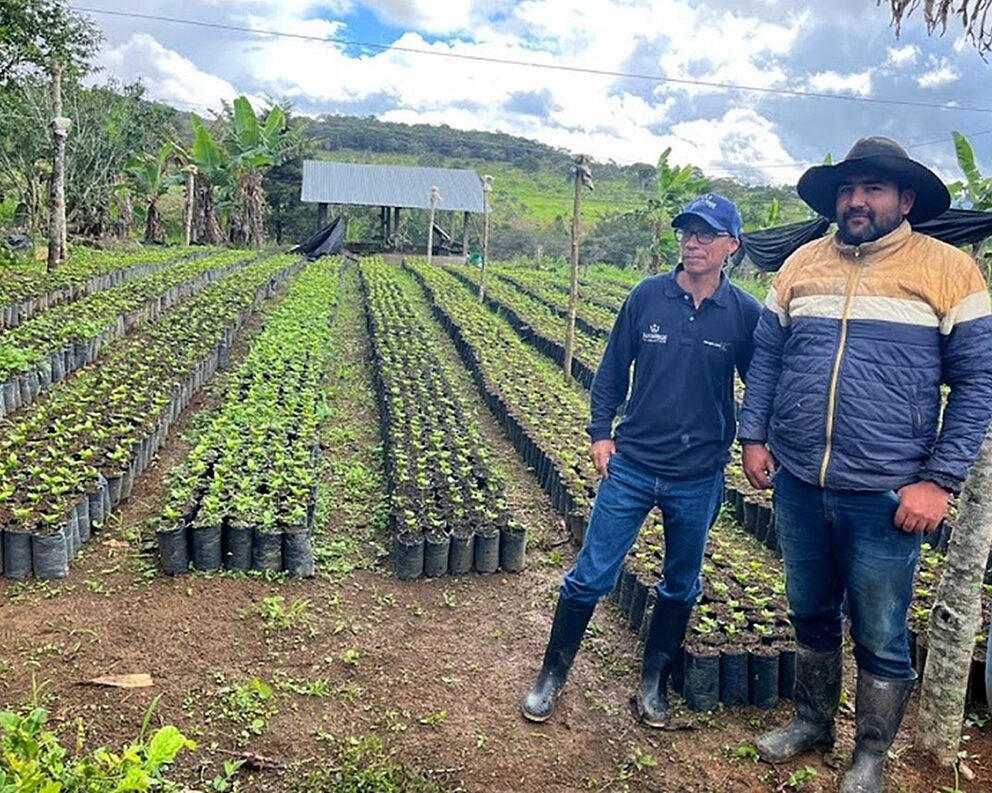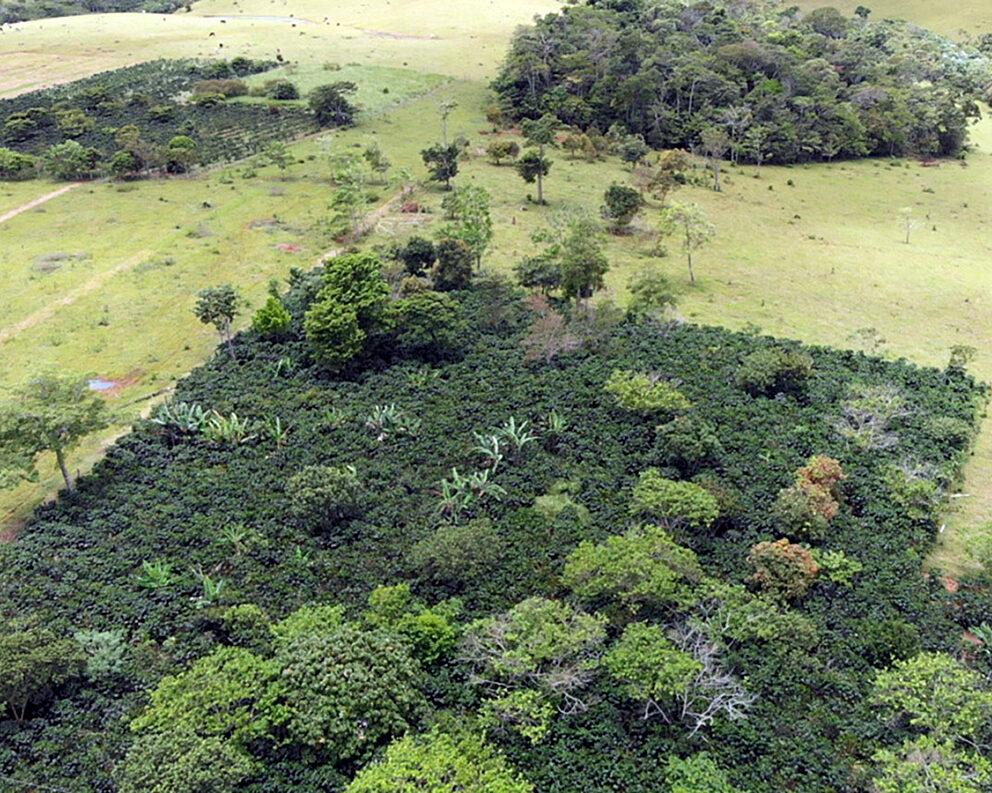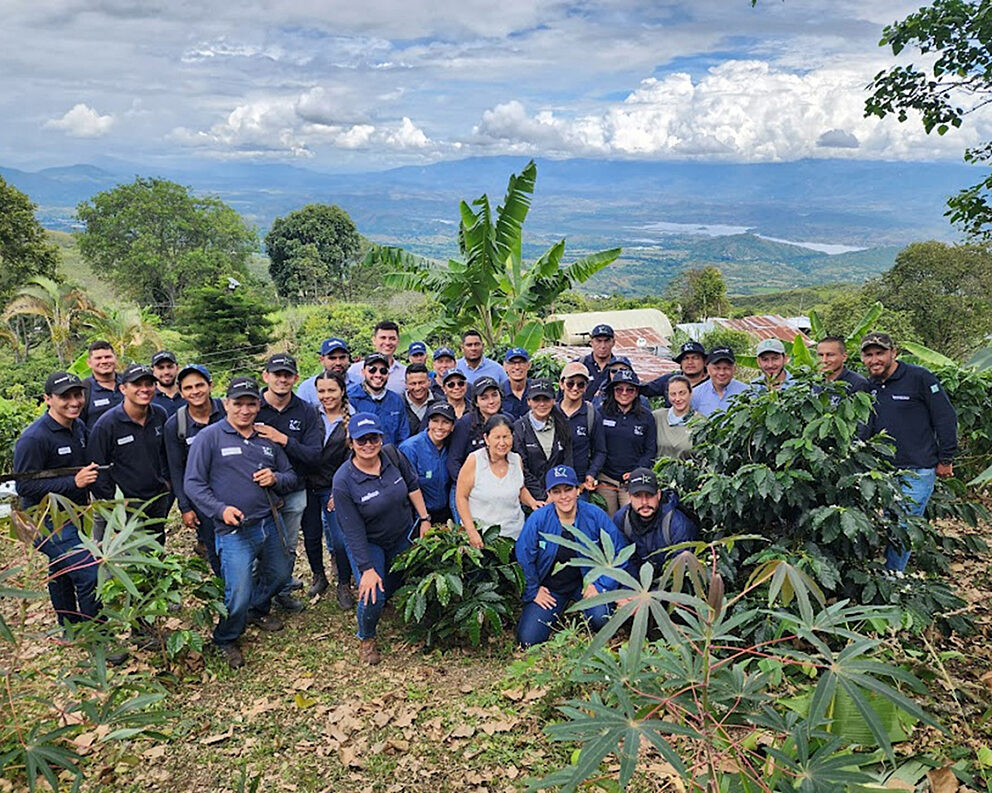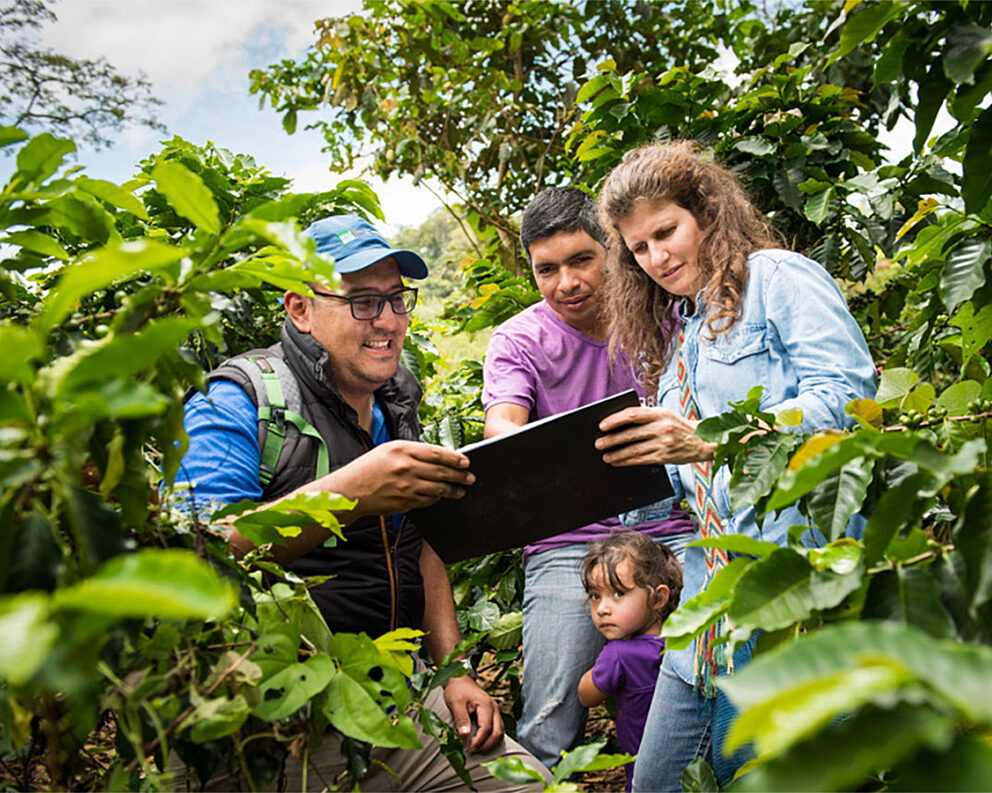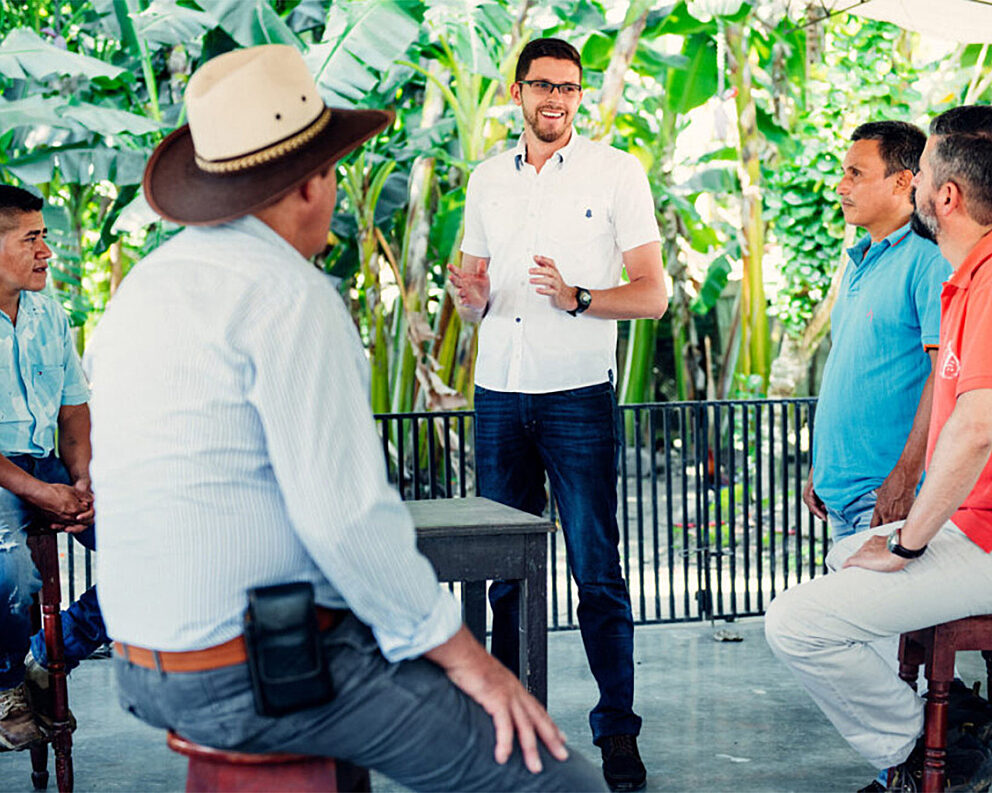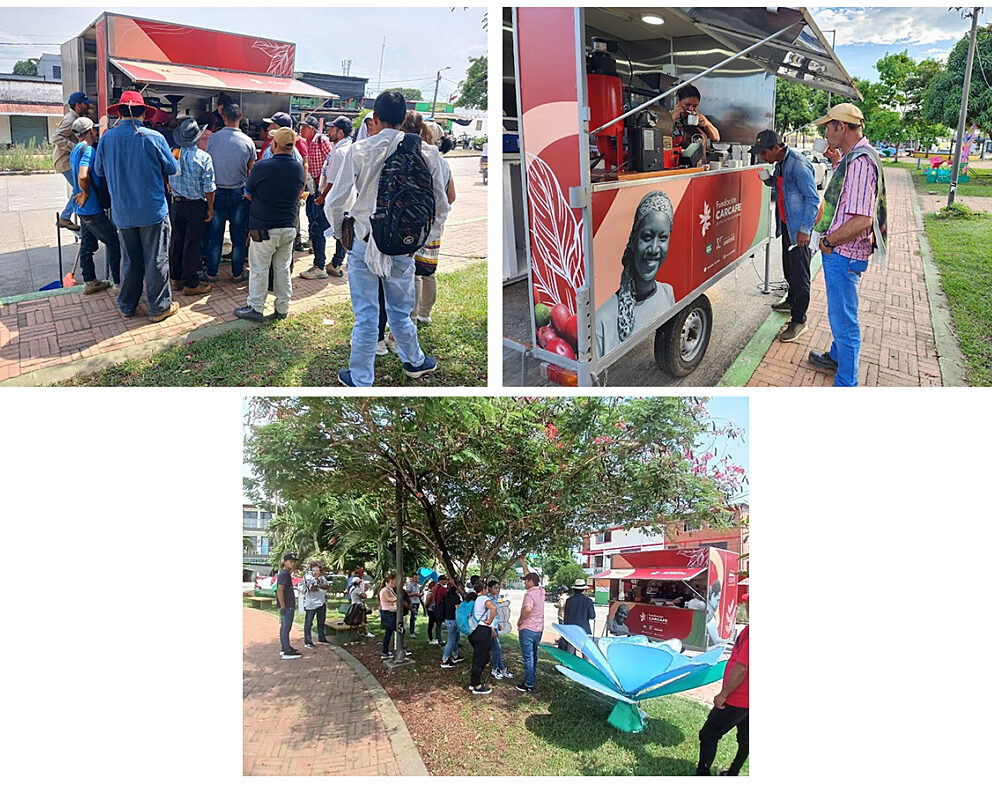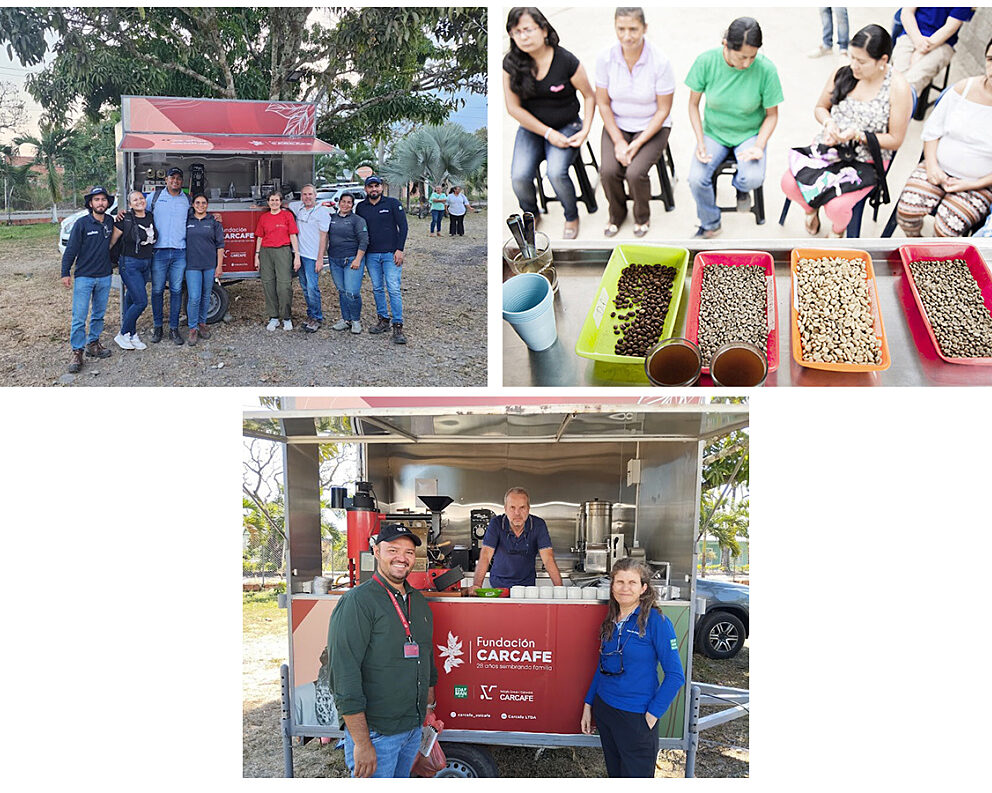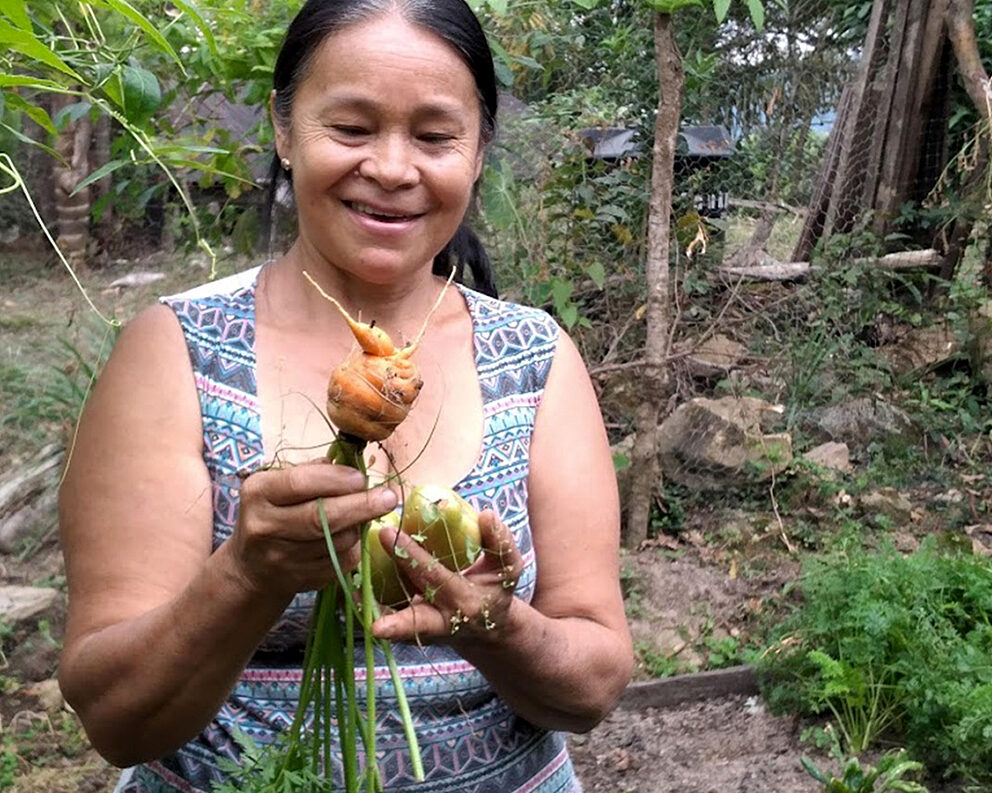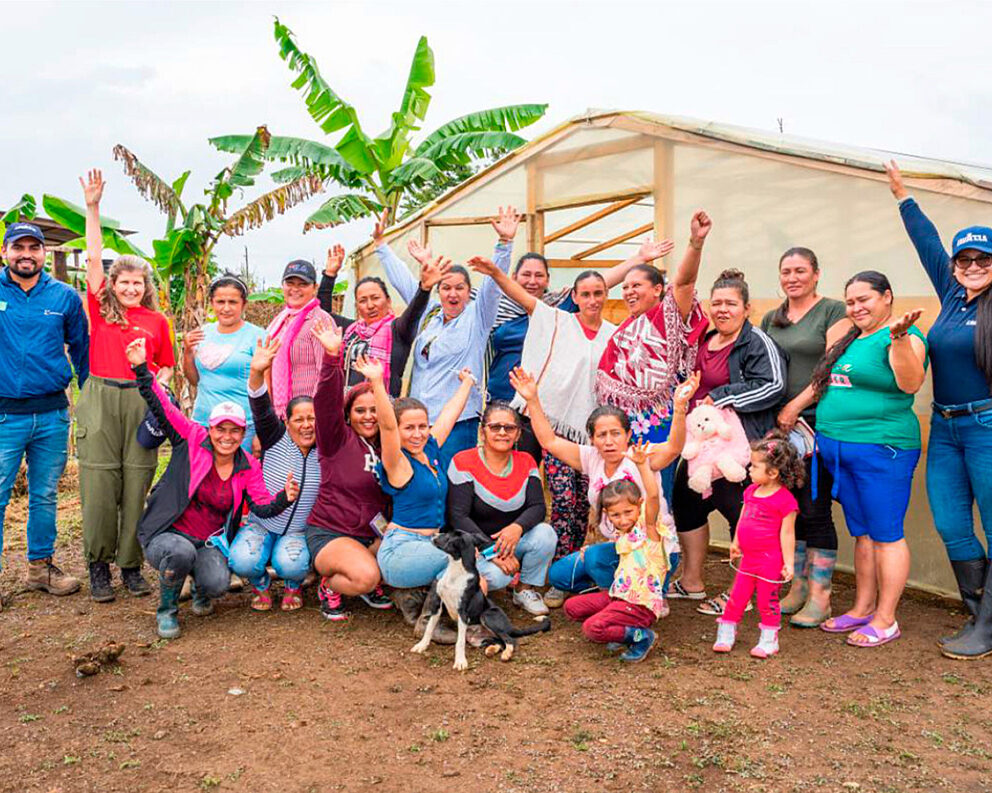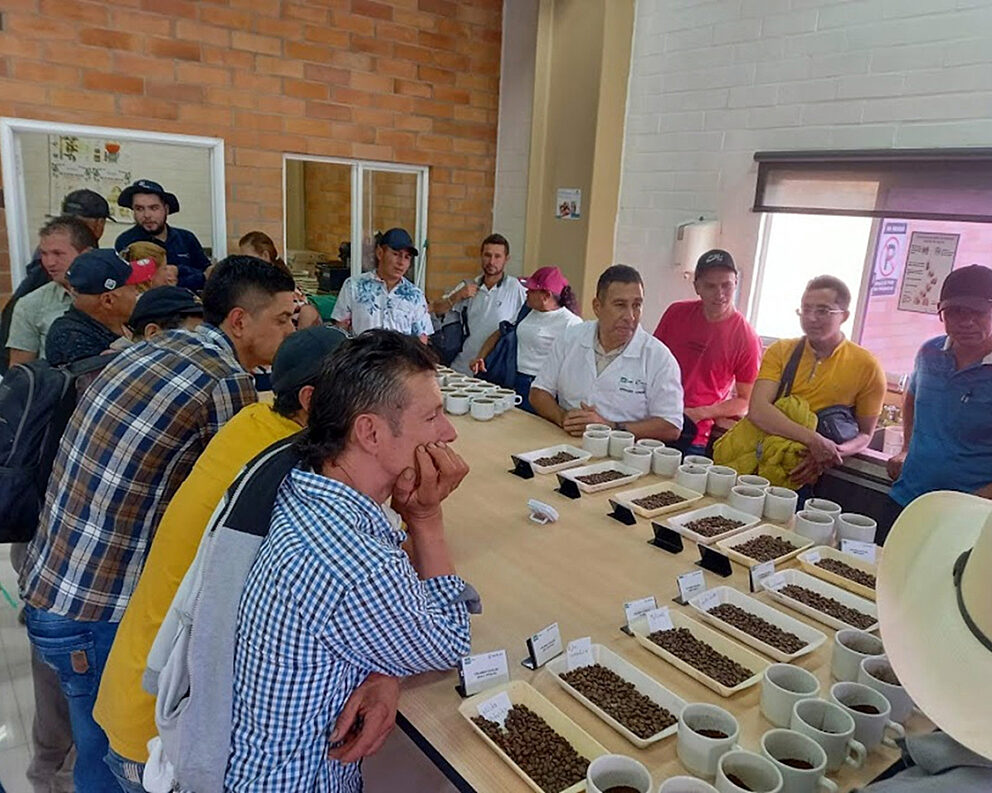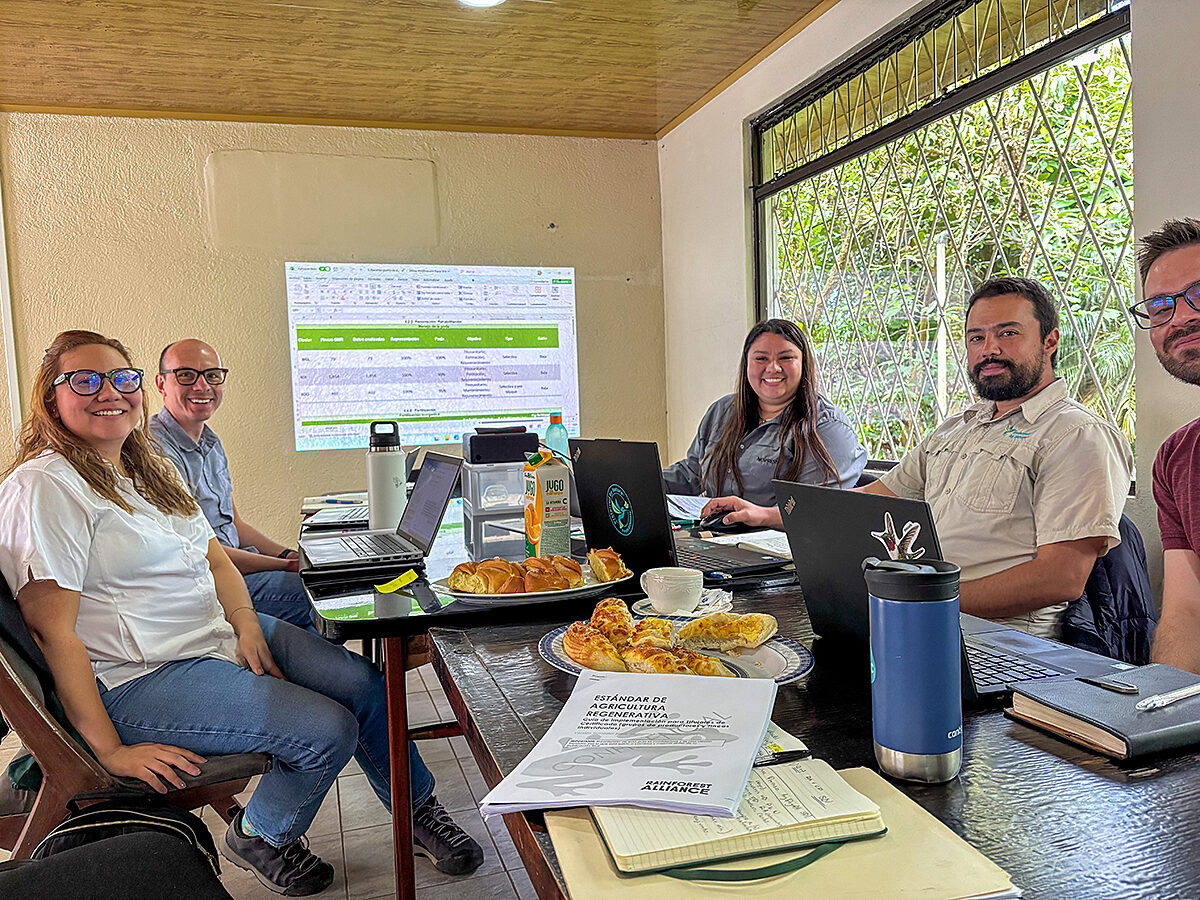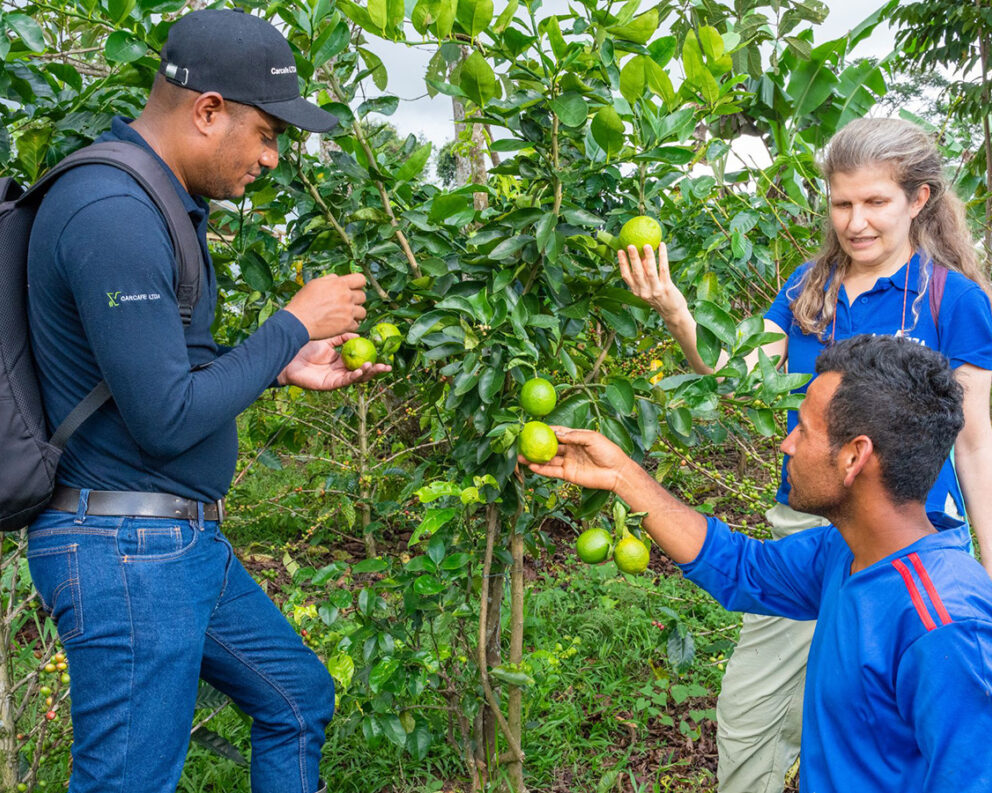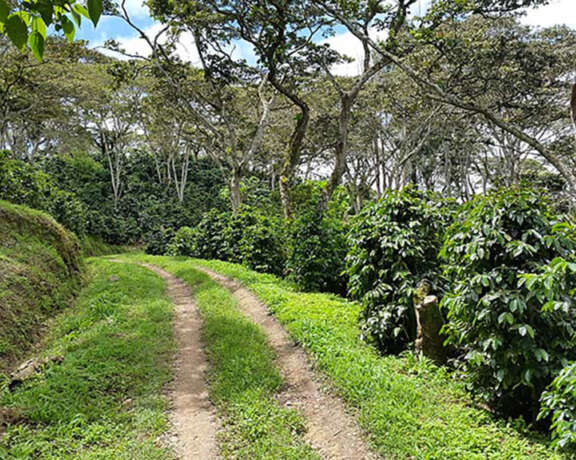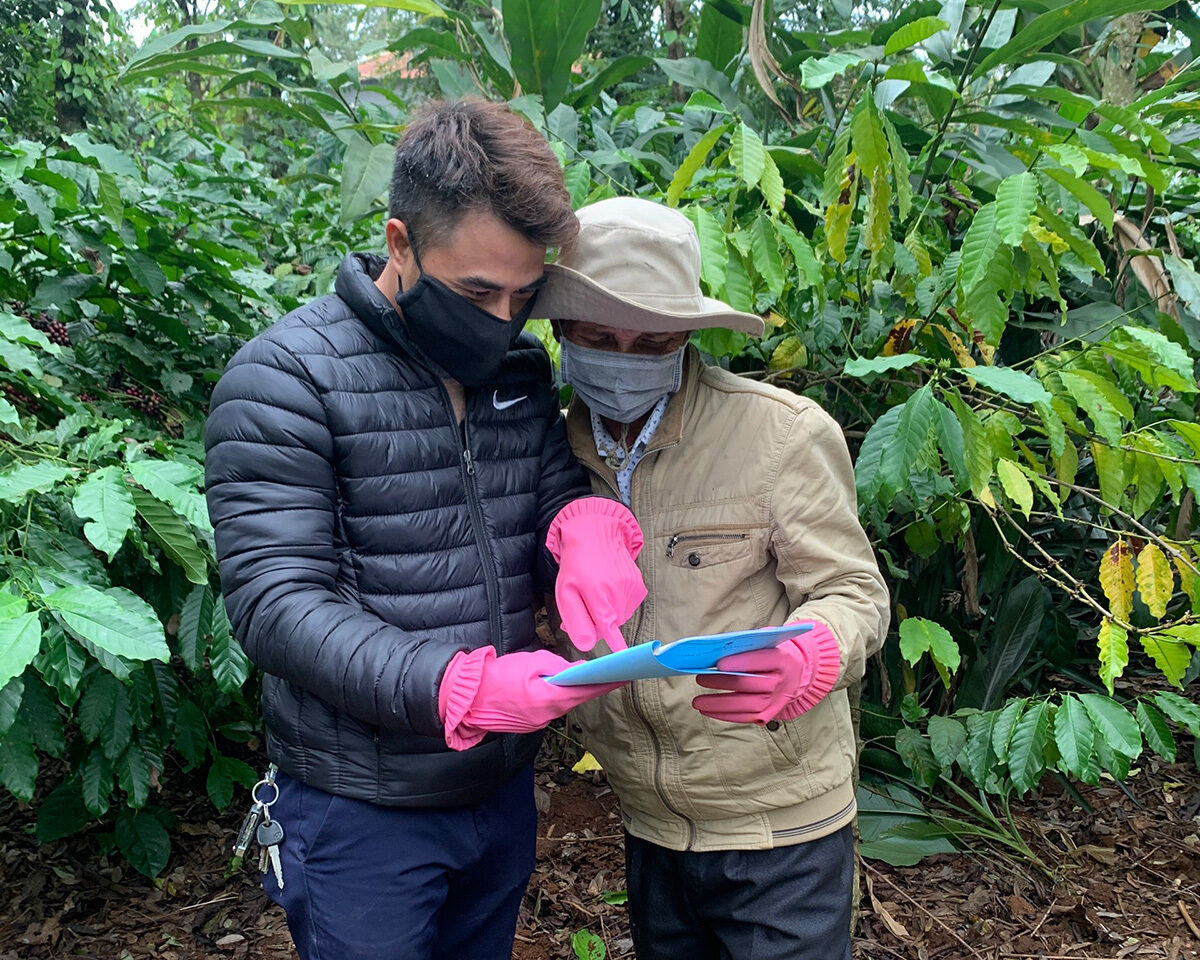Coffee and agroforestry alliance (re)generates impact for post-conflict farmers in Colombia
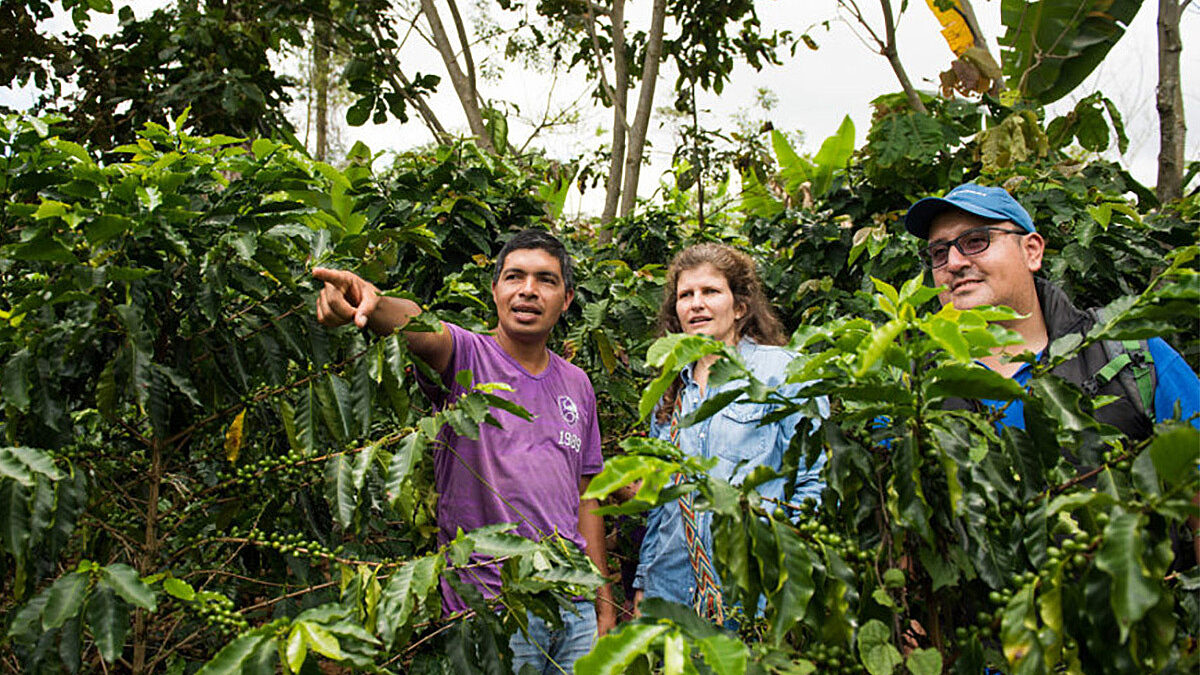
Natural corridors emerge as farmers mix coffee with native trees at their farms
Two years ago, we reported on a project that is changing the landscape for farmers in a region of Colombia once ravaged by conflict. Along with the Lavazza Foundation, the Carcafe Foundation – set up by Volcafe’s Colombian company, Carcafe – has been a key implementing partner in the project since its start in 2016. We are pleased to share an update on the progress of this project over the past few years, as new learnings and additional partners contributed to deepened impact.
Initially, the Tierra project involved 100 coffee farmers who, while building up their coffee farms after transitioning away from other crops (often coca), were also establishing biological corridors that helped conserve nature in a delicate ecosystem between two national parks, the Sumapaz Moor and La Macarena. The German development agency GIZ joined as a partner in 2021, under the auspices of its wide-ranging INCAS Global + programme, with support from BMZ, the German Ministry for Economic Cooperation and Development.
As the project’s success has expanded, so too has the number of farmers involved – now more than 700 coffee farming families have joined the initiative that is tackling a host of economic, social, and environmental challenges in the Meta region of southeastern Colombia. By farming and practicing conservation on a total of 6,734 hectares, the participants are helping to safeguard the landscape and improve their livelihoods.
Three interwoven threads run through the Tierra/INCAS project and reinforce one another, such that the longer the project has run, the more durable the resulting fabric has become. Read on to explore each thread below.
- Re-establishing coffee-growing
- Agroforestry to preserve and restore nature
- Strengthening producer organisations
Re-establishing coffee-growing
Meta is not one of Colombia’s traditional coffee-growing regions. Lower-altitude and hotter than many of the country’s mountainous coffee zones, the region had tended toward ranching rather than coffee production, before illicit coca cultivation boomed during the later decades of the country’s conflict. This created challenges, as there was little family history or local knowledge to draw on as farmers set out to grow coffee. Meta’s low population density also meant farms were far apart, making it harder for farmers to seek advice from neighbours. The warmer, wetter climate also favoured pests and diseases that can hurt coffee plants.
To grow coffee successfully in Meta, farmers needed advice and training. Through the Tierra/INCAS project, Volcafe Way farmer support technicians with advice from Cenicafe (Colombia’s national coffee research centre) have worked with the farmers to spread knowledge of good agricultural practices while improving coffee quality and farm productivity.
‘The coffee that I planted was wrong,’ admits Pedro, one of the project farmers who had spent many years internally displaced prior to his return to Meta. ‘Before they did not plant [coffee seedlings] in bags, they planted the tall plants. There wasn’t technical assistance or anything. I did not do it with germinator, I dumped the seeds directly on the soil … I had seen my father doing just that.’
Between 2016 and 2021, the project team spent 7,746 hours in training sessions with farmers – often one-on-one due to the distances between farms and the particular needs of each participant. Training topics ranged from appropriate fertiliser use and integrated pest management (IPM) approaches, to nursery development, plant nutrition, and harvest and storage techniques.
A new start after conflict
Decades of civil conflict in Colombia meant that many Meta residents had faced persistent insecurity – including pressure to grow illicit coca, forcible recruitment and extortion by armed groups, and the threat of violence and displacement.
The 2016 peace agreement between the government and the FARC – the guerrilla group that had controlled much of Meta for decades – included provisions for newly founded villages where demobilised FARC members and their families could start their post-conflict lives. The Tierra/INCAS project area includes one of these villages, where about 250 families are finding their bearings and building new livelihoods through coffee cultivation and work at coffee farms.
The Tierra/INCAS project has also invested in the establishment and rejuvenation of coffee plantations. Since 2016, some 215 new hectares of coffee have been planted and 280 hectares of existing coffee were rejuvenated. So far, 1,059,650 coffee trees have been planted and another 876,255 rejuvenated – nearly 2 million coffee trees in total.
The new practices and plantings also increase the productivity of the farms – by 2021, average yields per hectare exceeded 990kg of parchment (the pale coffee beans that emerge from processing ripe cherries), a 40 percent increase over the baseline value of 706kg/ha from a few years earlier. More recently, some of the project farms have achieved yields in excess of 1200kg/ha.
The project can play a part in reversing decades of damage caused by conflict, illicit cultivation, and isolation
Agroforestry to preserve and restore nature
In a region between two national parks and crossed by important river systems, the Tierra/INCAS project’s delicate setting required a calibrated response to reverse past damage from farming and ranching. Agroforestry, including the replanting of native trees at farms, promised several positive results such as the fostering of natural forest corridors for wildlife, better coffee yields thanks to shade tree cover, and improved food security via crop diversification.
Experts from the National University of Colombia advised Tierra/INCAS farmers on forest protection and agroforestry approaches suitable for the region, designing systems that could be replicated. Subsequently, through Volcafe’s partnership with CATIE – a Costa Rican agricultural research institute – Volcafe Way agronomists were trained on the agroforestry systems which they could then teach and implement with the farmers. The partners developed four complementary approaches for the Tierra/INCAS project area:
- An agroforestry and coffee system, in which various tree species intermingle with coffee plants
- A forest grazing system, placing strips of grass for cattle between rows of varied tree species
- A forestry-agriculture system, mixing food crops (like corn, squash, and beans) among rows of trees
- Assisted natural regeneration (ANR), in which shade tree saplings are planted near the banks of rivers and streams to create buffer zones that contribute to water conservation.
One farming area can use multiple agroforestry systems, creating diversified income streams, boosting food security, and increasing biodiversity. Planting native tree species also contributes to regeneration and reforestation in areas where coca cultivation and ranching both led to the clearing of forests in decades past.
At the 700+ farms involved in this project, more than 95,000 shade trees have been planted alongside nearly 2 million coffee plants planted or rejuvenated. 648 hectares of land are now using these agroforestry systems, including 74 hectares of ANR.
Each farm that implements an agroforestry system is like a seed sown – as the trees mature and these islands of diversity spread, they will extend the nature corridors across the region, creating a reforested bridge between the two national parks.
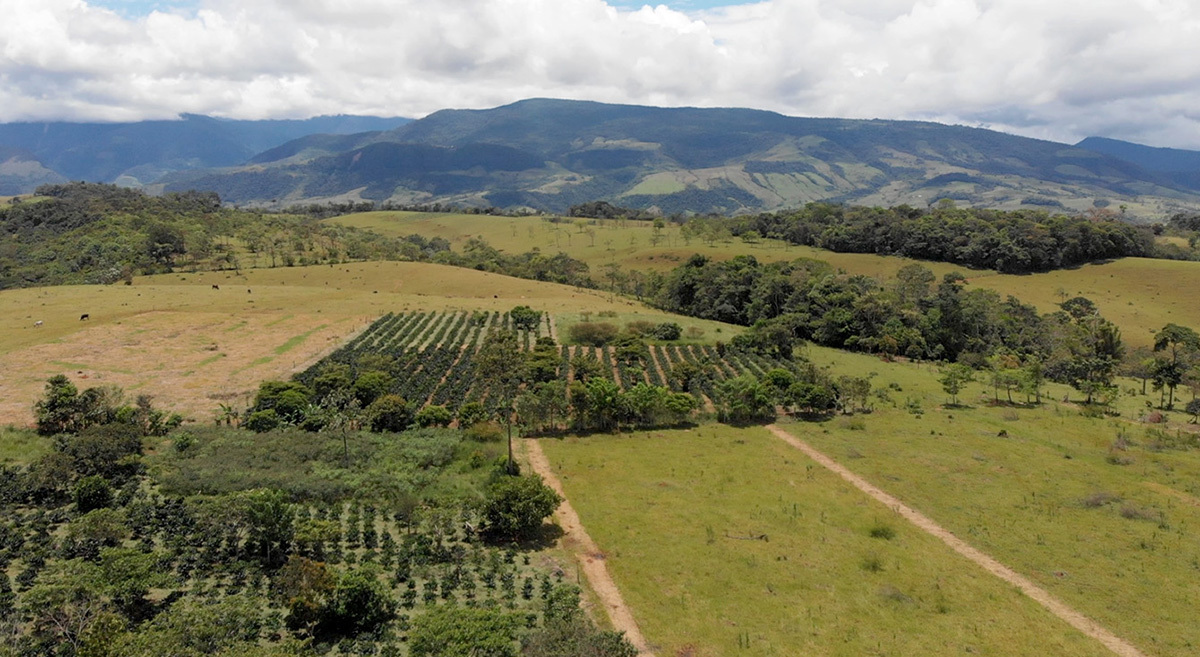
Agroforestry ‘islands’ form corridors through former grazing lands.
A new ‘crop’: Farms receive credits for carbon sequestration
Agroforestry systems have opened up possibilities for another income stream for farmers.
Since 2023, about 350 of the Tierra/INCAS farmers have added their farms to ACORN, a carbon trading platform created by Rabobank specifically for small-scale farms. Working in conjunction with Dutch partners Solidaridad and Rabobank, this has meant that project farms implementing the agroforestry and coffee system can generate credits for the carbon sequestered at their farms. Italian coffee roaster and Tierra/INCAS project partner Lavazza has begun purchasing these carbon credits to support its own carbon reduction efforts. This cooperation is an important step toward paying farmers for their ecosystem services.
Strengthening producer organisations
By working together in cooperatives, farmers can achieve economies of scale and improve their negotiating position in complex value chains. To support the farmers involved, the Tierra/INCAS project has worked to nurture new producer organisations and strengthen existing ones. The project hired an organiser to help form associations of 30-60 farmers each and train members on topics including good governance, teamwork, recordkeeping and entrepreneurship as well as the proscription of child labour, discrimination, and harassment.
As the scale of the project grew, the nature of the support to producer organisations also expanded to include the construction of facilities for cooperatives, such as communal coffee drying facilities (suitably dried coffee improves quality and can fetch better prices for producers). Recognising the persistence of gender disparities, targeted trainings also focused on support for women coffee farmers, and 300 grocery gardens were established by female-head-of-household farmers to bolster their food security, particularly important during the COVID-19 pandemic.
Working as cooperatives has also helped many of the farmers meet the requirements for Rainforest Alliance certification, which can lead to improved prices for their coffees. Carcafe (Volcafe in Colombia) has lent support by purchasing coffee directly from these producer associations, thus avoiding the cuts charged by middlemen. So far, Carcafe has directly purchased over 1.5 million kilos of coffee from the cooperatives involved in the Tierra/INCAS project.
It may come as a surprise to readers, but many coffee farmers have never tasted their own coffee after it’s been roasted. The connections between humidity, the cherries’ colour at harvest, fermentation levels, storage practices, and the final taste are not so obvious to nascent coffee farmers. Using its mobile coffee laboratory Carcafe is reaching out to 500 of the Tierra/INCAS farmers to enable them to taste their own roasted coffee and learn how different factors can affect the ultimate quality of the cup (and thus the offer they’ll receive).
Supporting legal clarity on land use for farmers
The Tierra/INCAS project also supports coffee producers to clarify the legal status of their farms. In some cases, the farms touch buffer zones and waterways near protected nature reserves.
Assessments of each farm are carried out using satellite imagery and on-the-ground checks. The local environmental authority CORMACARENA uses these inputs to draw up maps that indicate the legally permissible uses of land at each farm – for instance, a farm might have one zone of protected trees near a waterway and another area zoned for an agroforestry and coffee system. The details for each farm are captured in an agreement called a ZARP (rapid environmental zoning programme) voluntarily signed by the farmer, the local mayor, and CORMACARENA.
Project partners GIZ, Lavazza, and Carcafe have all supported this initiative. So far, more than 80 of the 250 affected farmers have signed ZARP agreements with the local authorities committing to respect the zones, thus safeguarding both conservation and livelihood improvement efforts.
Partnering for a better future
Through its three threads, the Tierra/INCAS project has brought together the expertise and special skills of several partners, bridging topics including agroforestry, agronomy, carbon markets, cooperative governance, nature conservation, and post-conflict recovery.
‘It has been an interesting process because now it is no longer about working with traditional coffee growing communities, but with persons who discovered that planting coffee could be a part of the change of life that they longed for,’ says Vivian Vasquez, Project Coordinator with Volcafe in Colombia.
‘The progress and growth so far is very encouraging – at Carcafe we are proud to be a core part of this multi-pronged approach that is responding to the unique needs of coffee farmers in Meta,’ adds Sebastian Pinzon, General Manager of Carcafe.
The long-term vision of the Tierra/INCAS project means that its impact will continue to grow, reaching full fruition only some years or even decades from now. But to safeguard that future, the farmers need to be able to earn a decent living from their farms. So far, progress on this crucial indicator is also positive: as the project gained momentum with its first 100 farms, the percentage of participants living in poverty fell from 42.7 percent in 2018 to 13.3 percent in 2021. The figure for those living in extreme poverty dropped from 9.4 percent to 2 percent in the same period. We look forward to seeing these trends continue with the farmers partaking in the expanded project.
The overall aim is clear: If farmers can make a decent living by using agroforestry to mix coffee, food crops and cattle, while extending forest corridors and respecting nature, then the project will have played a part in reversing decades of damage caused by conflict, illicit cultivation, and isolation. Take it from Don José, a once-displaced farmer who returned to Meta and is a participant in the Tierra/INCAS project: ‘Coffee had never given me such good returns as now; it is the land!’
Quick facts
Country: Colombia
Objectives: In southeastern Meta region, re-establish coffee-growing, promote appropriate agroforestry systems to preserve and restore nature, and strengthen producer organisations.
Timeline: 2016 onwards
Impact: 700+ farms involved: 215 hectares of new coffee planted, 280 hectares of coffee rejuvenated – nearly 2 million coffee trees in total. 95,000 shade trees planted in 648 hectares of land using four agroforestry systems. Significant poverty reduction among participants.
Editor's note: The second paragraph was amended on 5 Mar 2024 to include a reference to BMZ.
Marie Renou-Ullrich, Head of Marketing and Communications, email hidden; JavaScript is required


